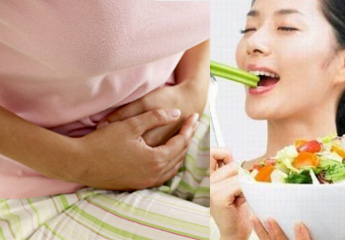
Menopause is ceasing of menstruation and occurs between 45-50 years of age. Each woman passes through this and it is considered as a normal sign of aging. Women are born with a finite number of eggs, which are stored in ovaries and control menstruation and ovulation. They also regulate the hormones – estrogen and progesterone. Once the ovaries have stopped releasing eggs, menstruation stops. Some women may have an early menopause due to chemotherapy, certain surgeries or an unknown cause.
Following are few symptoms which occur around the time of menopause:
- Insomnia or sleeping problem.
- Irregular period or skipped periods.
- Fatigue.
- Depression, irritability and mood swing.
- Headaches.
- Joint pains.
- Vaginal dryness and change in libido.
- Bladder control problems.
- Night sweats and hot flashes.
- Thinning of hair, itchy skin.
Though not all women experience all of these symptoms, most of them may suffer from few of them.
Menopause is a natural process and we cannot do much to prolong it, but we can surely make it more bearable. After menopause a woman’s body undergoes lots of changes, some of which go unnoticed. But if you do not take proper care, this time can be painful period. To know how to take good care of your health it is important to understand what causes of a particular symptom and whether menopause is a risk factor to other illness.
After menopause your risk of certain medical disorders increases:
- Cardiovascular diseases – As you approach menopause your estrogen level decreases and this inturn increases risk of cardiovascular disorders.
- Osteoporosis – In this condition bones become weak and brittle. Post menopause your bone loses density and risk of osteoporosis increases. Women with osteoporosis are more susceptible to bone fractures especially that of hip, wrist and spine.
- Bladder problems – Post menopause the tissues of vagina and urethra loses elasticity leading to sudden urge for urination, involuntary loss of urine during coughing, laughing or lifting. The chances of urinary tract infection also increase.
- Sexual function – Loss of libido is a very common symptom caused due to vaginal dryness, loss of elasticity and hormonal changes.
- Weight gain – As the metabolism slows down during menopause many women tend to put on few extra kilograms.
Dealing with menopause can be difficult. The symptoms often are overwhelming, but few simple steps can help you lead a better life. Let us see how:
- The foremost step is to keep a track of your symptoms, make a list of medicines or herbs you are taking and consult the doctor.
- Your doctor may suggest a hormonal therapy which is one of the most effective treatments for hot flashes. Estrogen doses will not only help you get relief from hot flashes but also prevent bone loss and provide benefit to heart.
- Vaginal estrogen is also available which can be directly administered into vagina using a cream, tablet or ring. This helps in relieving vaginal dryness and discomfort during intercourse.
- If you are suffering from heavy depression a low dose antidepressant can be helpful, of course after consulting your doctor.
- Calcium or other health supplements are quite essential to keep your bones healthy.
- Few simple remedies can also be beneficial – having cold water, or going to a cooler place can help relieve hot flashes. Caffeine, smoking, alcohol, spicy food trigger hot flashes, so controlling or restricting their intake can be helpful.
- Instead of estrogen inserts for vagina, you may opt for K-Y jelly, moisturizers and water-based vaginal lubricants. Being sexually active also helps increased circulation to vagina and is helpful.
- Get enough sleep; it takes care of depression, mood swings and other emotional problems.
- Massage or relaxation techniques sparks good health. Muscle relaxation can relieve a lot of menopausal symptoms. Deep breathing, paced breathing, meditation and yoga have shown good results.
- Regular exercise for half an hour can do wonders. It protects you against heart disease, osteoporosis and other aging related issues.
- Eating healthy, calcium and nutrient rich diet is essential. Since, metabolism considerably decreases after menopause, restrict your calorie intake. 1,600 calories if your activity level is low, 1,800 if you are moderately active and 2,100 if you are physically active should be ideal. Consume plenty of fluids, preferably water, at least 1.5 mg of Vitamin B6 daily, fortified cereals, lean meat, legumes and eggs.
- Equally important, as other mentioned points is – regular check. Menopauses increases risk for many conditions, hence it is crucial you plan regular checkups with your healthcare professionals. Your doctor may suggest various tests for determining the sugar level, cholesterol level as well as stress test and few more. Make sure you do the required ones.
- Screening for certain types of cancers like breast cancer, skin cancer, colon cancer is also recommended. Cancer if detected early can be easily cured, so it is advisable to have screening done on regular basis to avoid delay.
Menopause is not a disease and hence there is not set treatment for it. The above tips just provide you information that can help to provide relief from menopausal symptoms to some extent. Menopause is a biological phenomenon destined to occur, so go through to it positively. Find an approach to combat menopausal symptoms and spend time in focusing on the better aspect of transitional time. This is the time to make proper adjustments so that you live a long and healthy life. So stay lively, enjoy with your friends, consume healthy food, get enough sleep, exercise regularly and of course plan a romantic holiday with your partner.
